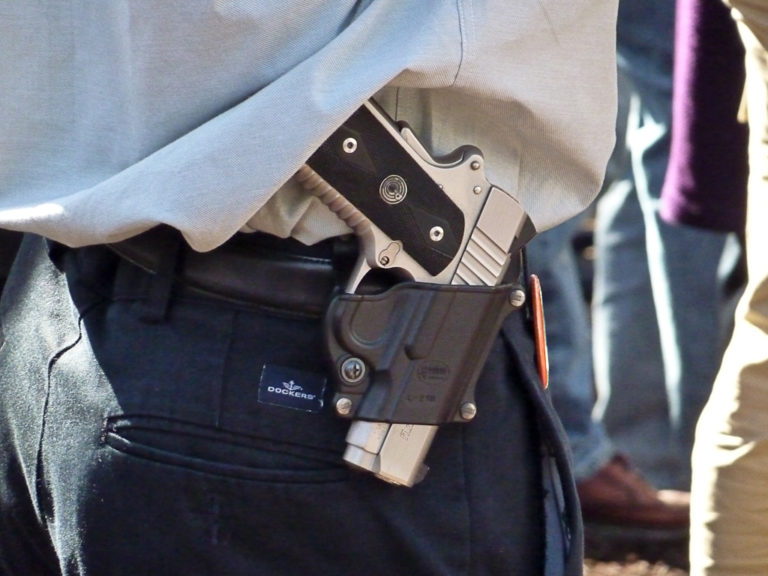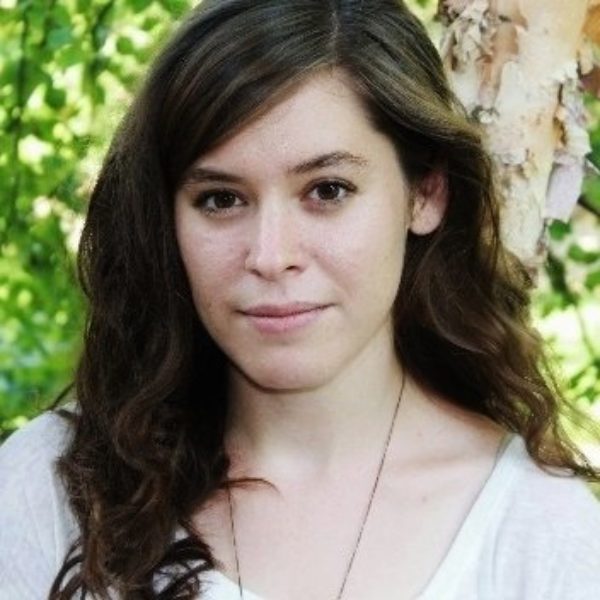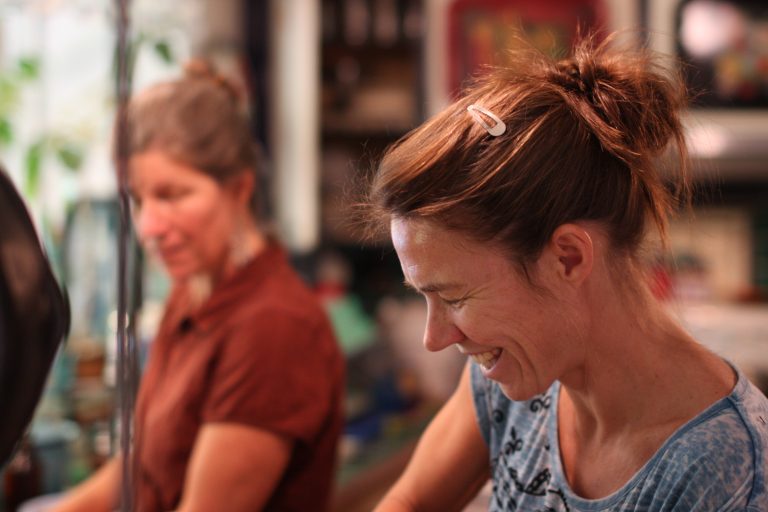
Image by Michael Tefft, Some Rights Reserved.
Of All Commandments: Sitting Beside My Neighbor
I work as a tutor at a community college writing center. A week after the mass shooting in San Bernardino, my boss sends me an email detailing the writing center’s emergency evacuation plan. The steps are listed under the heading, “Fire Evacuation Plan,” and includes a note reminding us to exit the writing center from the back door, through the kitchen, because the “bad guys” might know about the hallway.
On my way to work, I pass the semi-circle of backpacked Christians standing around the flagpole, singing songs my father’s congregation would call “contemporary.” Taking the stairs to the library basement, I walk down the hallway the “bad guys” might know about.
I’ve been told that the students at this community college are required to keep their guns locked in their cars, but as I open the door to the writing center I feel myself eyeing the students sitting with other tutors at long tables, their papers spread out before them. I almost unconsciously look at each person’s hip, where the gun might be.
Tutors sit next to, not across from, students, who bring half-written essays and crumpled homework, looking for help with transitional phrases, comma splices, and thesis statements. This aspect — that we sit next to, not across from, the students — is one of the few specific instructions I can remember receiving in my hasty training session. Now that I’ve worked as a tutor for a few months, sitting next to the students seems like one of the most important parts of the job. A student comes in and we look at their papers together, side-by-side, as neighbors.

A few months ago, I was out walking with my boyfriend in the morning on the greenway running alongside the Roanoke River. Further up the trail, we could see an older man in a yellow sweatshirt stopping people as they passed him. When we neared him, he called to us and told us there had been a shooting on live television, and the shooter hadn’t been caught. We thanked him for the warning, continued walking, looked at each other and shrugged. Maybe he was crazy? Maybe he wasn’t talking about Roanoke, but some other town? We got home, checked the news, and found the WDBJ7 anchors covering their own tragedy: an anchorwoman and a cameraman shot dead, another woman shot, on that morning’s news.
I’m originally from Memphis, which has been associated with crime and violence to a numbing, redundant degree. I love Memphis; it’s my home. I had been living in Roanoke for a little over two years when this city saw its name associated with gun violence for what might have been the first time. The 2007 mass shooting at Virginia Tech, about an hour away in Blacksburg, cast its long shadow over the area, but there had never been headlines like the ones piling up now, detailing what was now referred to as “The Roanoke Shooting.”
At first, I felt as shocked as everyone else, by both the violence itself and by the association of a town that had seemed so peaceful with something as gruesome as a televised, murderous rampage. But as I thought back over the past two years I’d lived in Virginia, I remembered one Saturday afternoon last spring, at the laundromat just down the street from my apartment. That afternoon the laundromat was hot, packed with families and kids. As we stood folding our clothes I noticed a mother at the table across from us. Her three blonde kids were running around at her feet, and she wore a handgun clipped to the waistband of her grey sweatpants. The gun weighed her sweatpants down, so she periodically stopped and hitched her sweatpants up, the gun swinging and swaying at her hip.
A few months later, my boyfriend and I had a yard sale outside the two-story white duplex I had been renting during grad school. We hauled an oversized brown couch onto the porch, slapped a price tag onto it, and sat in the shade of the porch. People drove slowly by all morning and into the afternoon. They’d peer over our stuff scattered on the lawn and would invariably call out to us, “You got any guns?”
At first, we laughed. But after the fifth, sixth, seventh time, I felt a chill. Was it legal to just buy a gun from your neighbor at a yard sale? Why were so many people out cruising for secondhand guns? What were these people arming themselves for, or against?

Last week a man in Rocky Mount, Virginia, one of Roanoke’s neighboring towns, was arrested while awaiting sentencing for another crime. The local newspaper described his first crime as using “a piece of rope to hang a dark-colored, life-sized effigy from a tree.” Set free on bond for a few months, Jack Eugene Turner apparently went home and placed a sign in his yard that read, “N****** lives don’t matter. Got rope?” Witnesses claimed the hanged effigy and scrawled sign were put up in response to some feud Turner had with his neighbors, who are black.
This last story isn’t about guns, but it is about neighbors. Jack Eugene Turner is terrorizing his neighbors, who surely live in fear of him. The people who drove by my house looking for guns were my neighbors, and I was afraid of them, and suddenly afraid of the neighborhood which had previously seemed so safe. The woman in the laundromat was my neighbor, and in her quest for a sense of personal safety she made a neighborhood laundromat feel incredibly unsafe to me and to the others, who, eyeing the gun clipped to her waistband, moved their baskets of laundry to the other side of the laundromat to be folded.
I think about all this at the community college writing center, where I sit side-by-side with students, as neighbors. I think about the fact that we’ve been sent a plan for evacuation to be used “in case of a fire,” and that we all know “fire” actually means violence from our neighbors.
After the shooting at the Oregon community college, politicians boasting “pro-life” Christianity tight as any badge of honor responded to the shooting with crass shrugs. Jeb Bush’s “stuff happens,” Donald Trump’s recommendation that teachers should have had guns, or Ben Carson’s suggestion that innocent students in the middle of writing class should be prepared to rise up and attack a fellow classmate when he pulls out a gun and orders everyone to the ground.
When I scroll through radio stations, I hear Rush Limbaugh arguing that if schools weren’t gun-free “liberal utopias,” that if more people were armed to the tooth and ready to kill, we’d be safer. It’s redundant and exhausting, at this point, to even argue with what these men are saying. Their argument isn’t safe, it isn’t pro-life, and it doesn’t reflect any kind of Christianity that I’ve ever known.

As a preacher’s kid from the South, I’m getting tired of defending Christianity, and sometimes I fear I’m losing the standing to defend it anyway. My father is a progressive Methodist minister. Growing up, I never knew any conservative preachers. I grew up very conscious of Mark chapter 12, verses 28-30, when a teacher asks Jesus, “Of all the commandments, which is the most important?”
The most important commandment, Jesus answers:
“Love the Lord your God with all your heart and with all your soul and with all your mind and with all your strength.’ The second is this: ‘Love your neighbor as yourself.’ There is no commandment greater than these.”
What’s always struck me about this exchange is that, even though the teacher didn’t ask Jesus what the second most important commandment was, Jesus made sure to tell him. I think this is at least partly because a commandment to love God alone could lead to a kind of arrogant self-righteousness. We must also love our neighbors — extending love beyond ourselves and our relationship with God. It’s hard for me to believe that loving your neighbor, one of the central tenets of Christianity — second only to loving God — means being prepared to shoot someone in order to stop them from shooting you.
Instead of more guns, or of “good guys with guns,” as is so often the refrain, I believe in investing in neighborliness, as I know it.
On the day Donald Trump proposed blocking all Muslims from entering the country, I came into the writing center and found a young woman waiting for someone to meet with her about her paper. I pulled up a chair, sat next to her, and asked her her name. Her last name was Mohammad, and her first language was Arabic.
I went through her paper with her, pointing out subject-verb disagreement, shifting tenses. She told me, in halting English, what difficulty she was having writing in this new language. We laughed over some of the rules of this strange language, which often seem wishy-washy or even contradictory to new speakers.
As she packed up her things to go, I pointed out some English grammar handbooks with chapters focusing on multilingual writers. When she left, she looked me in the eye and thanked me, and I thanked her.
Interactions like this are the only antidote I’ve found to the nearly constant sense of dread I’ve felt building inside me, a dread that leads me to eye passing strangers with suspicion. I’ve felt this dread when nervous-looking white guys come into the writing center late at night, when I’m alone, and they approach my desk just a little too quickly. Usually, they’re just eager to talk about a paper that’s been giving them stress, and I immediately feel ashamed to have been afraid.
So when I come into the writing center, I come unarmed, ready to help as best I can with student’s essays. When a student arrives, I pull out a chair and invite them to sit next to me. And we begin, as neighbors, solving the problems together.

